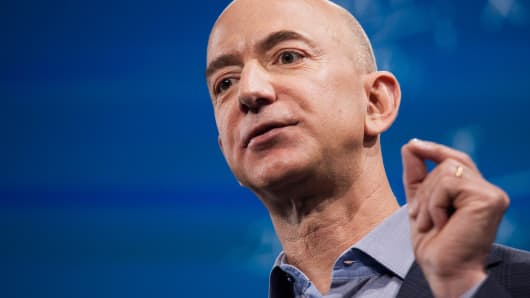With its stratospheric P/E ratio, Amazon is currently valued as a venture-capital company looking to strike it big. But the problem is that the businesses that Amazon is entering into are highly competitive and not likely to yield huge profits. If Samsung is having problems with their cellular phone division, you can be assured the Fire phone is up against a very tall task of gaining market traction.
Read MoreInvestors are fed up with Amazon, analysts say
And that really is the problem for Amazon as I see it; they are spending huge sums of money in lower margin enterprises simply to capture market share. At some point in time, profitability is going to matter. And when profitability finally is the goal of Amazon, investors could endure a stiff selloff as the valuation simply does not justify its current profit stream. In fact, last quarter, Amazon shocked the market by actually reporting a huge loss, stating that future investment costs will impact profitability for a significant period of time.
Both Apple and Google have price-to-earnings ratios less than 1/10 that of Amazon. In fact, name virtually any large-cap tech stock and the valuation is more in line with market norms relative to Amazon. Amazon has huge revenues but no profit to speak of as of late and the company seems not to be concerned despite increasing costs for Amazon prime and other infrastructure spending. The P/E ratio is growing higher not lower.
Consensus from analysts is that the P/E ratio will start to slow down next year and the following year. Can we really be sure of that?
Read MoreWant a better return than Apple or Google? (Hint: Think booze and underwear)
Eyeballs are important and that's what Amazon is seeking to capture. It's no different than Facebook's acquisition of WhatsApp; it wasn't about profitability but about capturing eyeballs and attention. But just like the WhatsApp acquisition, investors are starting to wonder how profit will look based on current dollars spent. Amazon will have to decide what it wants to be in the future and target its costs and investments towards that long-term goal. Right now, Amazon is behaving as a company that is still seeking its identity. The company simply cannot be all things to all people.
Amazon is a wildly popular company with a huge number of users. At some point, the company is going to have to monetize that user base. When they do, a real valuation metric will kick in. The profitability better be sky high becaus,e with a P/E ratio that already is stratospheric, the expectations will be huge. I just don't see how they're going to be able to deliver the type of profitability that the P/E ratio demands and that's my problem with the stock.
If you are investing in Amazon, you are buying an Internet player looking to capture market share with no clear sign of the long-term profitability plan. It may pay off in huge rewards but the risk, in my view, is high.
Read More10 big tech stocks still 50 percent below 2000 levels
Valuations eventually matter, as Warren Buffett so often says, and when they do, I'm concerned that Amazon will be priced based on its profitability rather than its revenue. With the P/E ratio many times greater than the overall market, that profitability is going to be highly scrutinized and I fear simply will not live up to the lofty expectations currently set by the market.


